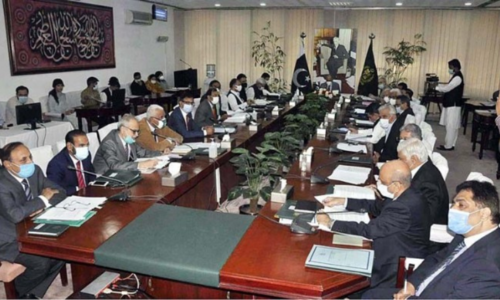ISLAMABAD: As the government mulls an upward revision in the minimum support price (MSP) for wheat, the Pakistan Institute of Development Economics (PIDE) has warned that any such move could lead to a further increase in inflation.
The PIDE said that if the government sets Rs1,750 MSP per 40kg wheat bags, the move will increase inflation by 29 basis points (bps). It will increase by 22bps in case the government raised MSP to Rs1,650.
However, a bumper crop and good governance may reduce the pass-through on inflation and vice versa. Therefore, the government has to have reasonable control over the administrative side to have a minimal impact on food inflation.
The study was conducted by three PIDE researchers — Dr Abdul Jalil, Dr Saud Ahmad Khan, and Dr Nasir Iqbal who developed several scenarios to assess the impact of wheat MSP increase on national inflation in the baseline case.
“We find a low correlation between MSP and food inflation as compared to retail wheat prices”, researchers noted.
More interestingly, retail wheat inflation was even negative in 2014 and 2015 when the government increased MSP from 1,200 to 1,300. Furthermore, retail wheat price is much higher than MSP; therefore, we shall not see the complete pass-through of the MSP increase in inflation.
It was suggested that the government must take appropriate measures to reduce the gap between MSP and retail price of wheat and recommended promoting competitiveness in the wheat market to reduce market distortion costs and avoid illegal trading.
The cost of wheat production is high, with low productivity in the country than neighboring India and Iran. The government can tackle inflationary pressures by promoting competitiveness in the wheat market. It was further argued that high yielding and relatively low-risk varieties need to be introduced by involving the private sector. Knowledge-based innovations and interventions will increase competitiveness, ensure future food security, and reduce the trade deficit.
Over the past few months, Pakistan’s government is struggling to fix wheat prices in the country due to weak governance and mismanagement. For the current price of Rs1,400, the market price of wheat was Rs2,256 per 40kg in the first week of October.
The Ministry of National Food Security and Research suggested that wheat’s support price should be increased to motivate farmers to increase the crop’s production in the future. The Economic Coordination Committee (ECC) consulted ministers and special aides to conclude whether the support price should be increased by 25 per cent from Rs1,400 per 40kg to Rs1,745.
The ECC will consider the issue in the next meeting.
Food prices are climbing fast in recent months, posing a possible threat to livelihood of poor households. Furthermore, food inflation has remained a major contributor to inflation over the last decade.
To ensure a smooth supply of wheat and incentivise farmers to produce more, the Pakistan Agricultural Storage and Services Corporation procures wheat on MSP. This price is based on the excess and shortage of wheat supply in the country. Through the MSP, farmers receive a fair amount of price for their upcoming crops to invest in production of agricultural commodities.
Published in Dawn, October 25th, 2020














































